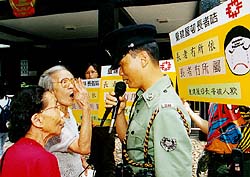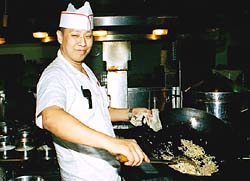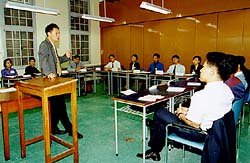



















'When we advised them to leave the area one suddenly hit and kicked me - I was very surprised as I didn't expect a peaceful demonstration to turn violent' | |
 Face-off: Station Sergeant Li Chun-wai keeps his cool amid a flurry of words from angry protesters |
THE
role of the Police is to maintain law and order and prevent crime. However, some people may think crowd
management is a comparatively easy task. In fact, it is not the case. In addition to exposure to sun and rain,
police officers sometimes face hostility while carrying out duties.
There are frequent public assemblies and protest marches in Central and its Divisional Commander Clara Ng said Police respected the public's right to expression and extended help as far as possible to ensure events are smooth. It is therefore necessary for measures to be taken to ensure safety, to protect life and property as well as keeping traffic controlled.
|
|
Ms Ng said: "Police liaise with event organisers with a view to developing a mutual understanding to avoid
any possible conflict."
Unfortunately it is inevitable unpleasant events still occur. So how do frontline officers handle such situations? Case 1 - Station Sergeant Li Chun-wai is the Officer in Charge of the Chief Executive of the Hong Kong Special Administrative Region's Police Post. Part of his responsibilities is to receive petitions on behalf of the Chief Executive. Mr Li said in general, protesters were very polite. However some demonstrators feel unhappy as they do not understand it is his duty to receive the letter on behalf of the SARCE. Apart from impolite treatment, Mr Li has sometimes faced embarrassing situations. One time protesters forcibly placed a lantern used in funerals on his back and did not let him go. Asked how he handled the situation, Mr Li said the most important thing was to control one's emotions, keep calm and be patient to prevent matters from getting worse. He said: "I patiently explained to the demonstrators that there were many ways to air their opinions within the law and that since their views were expressed in the petition, it was unwise to do something which would affect other people. Case 2 - Administration and Support Sub-Unit Commander of Kowloon Division Inspector Wong Chi-keung took part in crowd management many times when he was a Station Sergeant in Wan Chai District between 1995 and 1997. Mr Wong said during a demonstration outside a hotel in 1997, demonstrators broke through the first cordon erected by security guards and were trying to break through the police cordon by climbing over a flowerbed. "I climbed up the flowerbed at once to block their way. However, one of the demonstrators grabbed my strap and tried to pull me down. My colleagues on the other side of the flowerbed held my belt firmly so I could maintain balance," Mr Wong said. He refrained from taking any action to protect the image of the Force and avoid provoking the demonstrators. Unfortunately, they suddenly let go and Mr Wong fell onto his colleagues, hurting one of them. "I felt disturbed at that moment, thinking that if I had not climbed up the flowerbed, my colleague would not have been injured. However, I knew that if I had not done so, the situation would have been out of control," he said. "I immediately arranged an ambulance to take the injured officer to hospital. I also calmed down the emotions of the colleagues at the scene to prevent them from developing a hostile attitude towards the demonstrators." Case 3 - Mr Wong's supervisor when he was stationed at Wan Chai District, Senior Inspector Tony Ho Kai-hin, has faced similar situations. The World Bank/IMF Annual Meetings were held at the Convention and Exhibition Centre (HKCEC) in 1997. While a group of demonstrators were discussing the arrangements for their activities with police representatives, some of the demonstrators suddenly rushed towards the HKCEC through Immigration Tower. Now the No.2 Platoon Commander Emergency Unit of Hong Kong Island, Mr Ho said: "When we advised them to leave the area, one of them suddenly hit and kicked me. I was very surprised as I did not expect a peaceful demonstration to turn violent." "I told myself that the most important thing was to carry on with my duties. I avoided her further attack and tried to calm her down together with my colleagues. "What I have learned from the case is that officers should always be on high alert in order to deal with any unexpected incident." Although the three officers have different experiences, they do have similar pointers for colleagues in handling such incidents. All of them agreed communication was of the utmost importance. Officers should make protesters understand Police will spare no effort to facilitate them if they want to make their views known in a lawful manner. In fact, the aim of the protesters is to express their opinions. Officers should therefore maintain a neutral stance and exercise restraint. Mr Li said: "As police officers, we should control our emotions in order to maintain our professional dignity and protect the image of the Force while discharging our duties." Mr Wong and Mr Ho noted that the behaviour of individual officers built up the image of the Force. Every Force member played an important role and Police can gain the respect and support of the public if all of them have the same goal. On impolite treatment, Mr Li said he would let it go. After completing one task, he would not think about it anymore, but would rather adopt a calm and positive attitude to face new challenges. Mr Wong said officers would feel proud of themselves for the efforts they had made to protect the image of the Force and prevent matters from getting out of hand. As for Mr Ho, he said officers should attach the greatest importance to their duties. "You will feel relieved as long as you know what you have done is right. You can get job satisfaction during the course and learn how to improve yourself and do your job better," he said. | |
for gourmet Tony |
|
AFTER
a month of bedridden pain and hospital food, Tony Li Ka-hung is back behind the wok searing the
taste buds of Airport District.
Staff at the District's Police Station had been without their beloved head chef for a month after Tony hurt his back in mid-April. The agony of the slipped disc left him unable to walk and surgery was required, along with a month of therapy and rehabilitation. |
 |
|
The 37-year-old gourmet has cooked for Commissioner of Police Eddie Hui and other senior
officers on a couple of occasions, winning their compliments. Although still suffering a bit of
a limp and slouch, Tony was a bundle of mirth when he cooked up a "chow faan" for OffBeat
who joined him for his return to work a couple of weeks ago. He said he was glad to be back
in the kitchen to speed his recovery, particularly to nibble some his own creations after the
agony of having to eat hospital food for a month.
"I really like to eat and it is very tempting to try something I'm cooking, even before it's finished - many people call me 'fei jai'," he said. "But it is very important to me to ensure I get good comments on my cooking and my staff, I really try to please everyone. With the kitchen we have here we can't be too diverse, but everyone has different tastes and I try my best to please them and I am very happy when I do." Bad reviews have seemed few and far between since Tony's company won the three-year tender to run the station's canteen two years ago. One of his biggest fans has been out-going Airport Deputy District Commander Chris Wilson. "Mr Wilson really likes his fish and chips in the English style which I really like too, along with steaks and other European foods. They are more fun to make and I think I am actually better at making European stuff. But fish and chips, I think, is my speciality," Tony said. At 17, Tony stumbled into his first cooking job by accident, in a typical Chinese restaurant. He then went on to the Mandarin Hotel where he honed his "chops" for 10 years before moving to a ritzy, up-market Chinese restaurant. He set up his own company in 1997 to apply for the Police tender and the rest is history. "This is my first job with my first company so of course I was especially happy to get the tender with Police. Although I have cooked for some famous people in the Mandarin, when I was younger I never dreamed I would one day cook for the Commissioner of Police. And what makes it even more amazing is this time, I am the boss!" |
| |
 Professor of politeness: CIP Raymond Ng advises a class of inspectors on the importance of officer's attitudes and manner |
NEXT time you're dealing with the public show
your "pearly whites" and be polite, you just may receive their full co-operation.
That's the advice of a campaign by the Complaints Against Police Office which is encouraging officers to prevent avoidable complaints. Since the Office's restructuring last September enhancements have been made in several areas, particularly in liaisons with frontline officers. They are being encouraged to be more polite and alert, not just at crime or accident scenes, but also in routine work such as identity card checks and traffic enforcement action. |
|
Superintendent CAPO New Territories Chan Kwok-keung said although there had been a general decline in the total number of complaints against officers, the actual number of avoidable complaints had risen over the last two years. Many of those were due to the manner of the officer from attitude and tone of voice, right down to facial expressions. "Hong Kong people expect more and better services every day, especially in the New Territories where the population is growing all the time." "So regarding avoidable complaints, we must send the right message to frontline officers so we can improve their working attitudes as part of general improvements to the quality of Police service," Mr Chan said. "What these teams are doing is maintaining a close relationship with Districts and working out strategic plans with which we can look at the issue of avoidable complaints. "Although general complaint figures are going down, we can always do more to reduce the avoidable ones." The public was becoming more aware of their right to complain which meant the adoption of a more proactive approach in preventing complaints was needed. Apart from District liaison, we also study areas in which the public are prone to complain," Mr Chan said. "Recently CAPO formed a special working group to study complaints stemming from identity card checks. We want to find out the common cause and then devise a prevention strategy." Chief Inspector Team Nine CAPO New Territories Raymond Ng Wai-ming, who has paid some 25 visits to training days and conferences since the CAPO restructuring, said District liaison offered two-way communication. "We brief frontline officers from the perspective of the complainants, but we also treasure their feedback. Police these days are more than crime busters. "Of course, when dealing with violent criminals, we have to retain a forceful image, but we need to be more empathetic and tactful with the general public in our routine police work, such as Identity Card checks, road blocks and issuing fixed penalty tickets," Mr Ng said. "These do cause certain inconvenience, so once the police action is finished or suspicion is cleared, the public expect a 'thank you' or a 'sorry for the inconvenience' from officers. "We are wearing two hats - upholding the law is the objective, but through the procedure of that Police also provide a service. "What most complainants feel aggrieved over is the manner of the officers rather than the enforcement action itself, in most trivial complaint cases." Mr Ng also lectures on complaint prevention to the Inspectorate Class at the Police Detective Training School. The lectures look at typical complaint scenarios, in particular officers are advised on practical steps on how to protect themselves from malicious or technical complaints. Accountability for complaints against their subordinates are also discussed. Students attending the courses are invited to participate in re-creations. Feedback from them has so far been positive. | |

![]()
